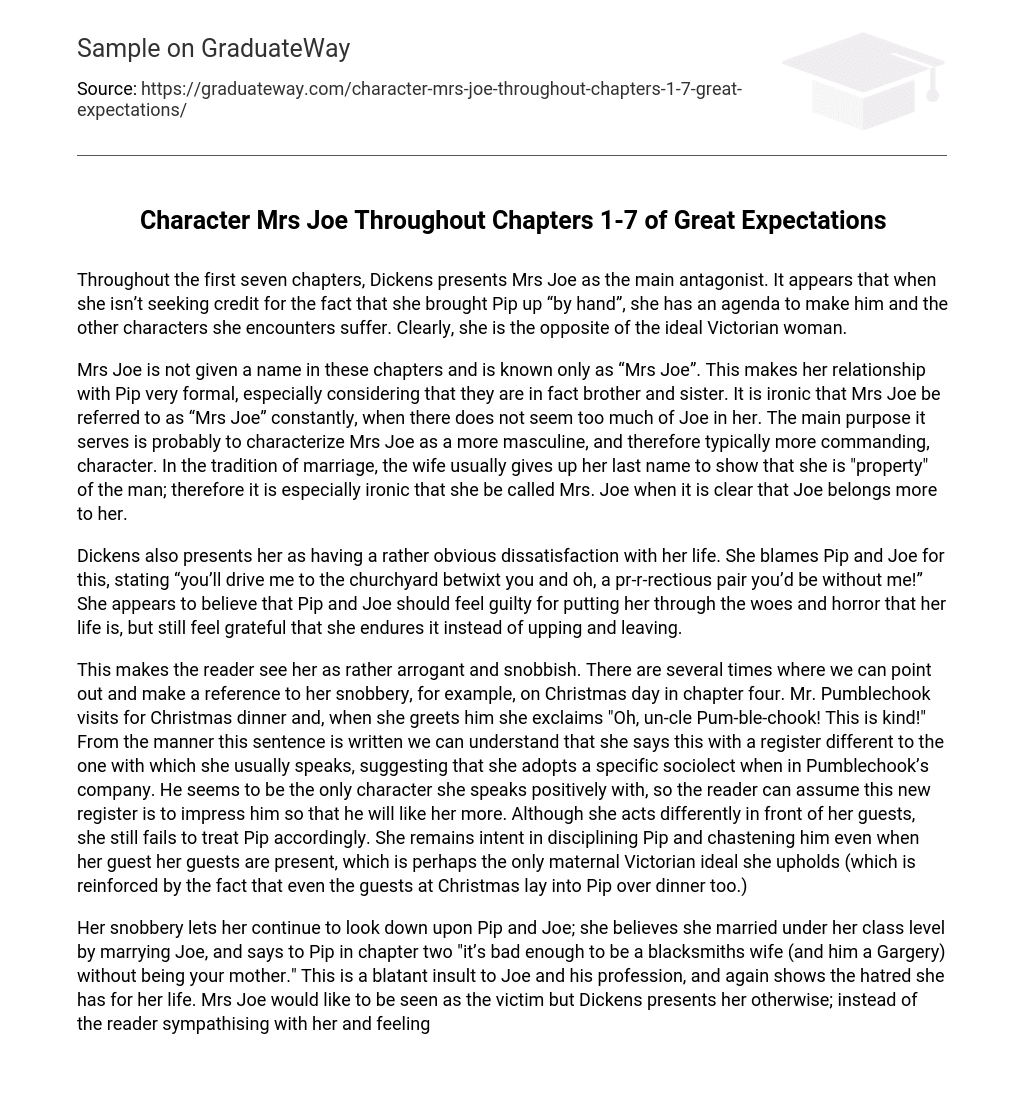Across the first seven chapters, Dickens presents Mrs Joe as the main antagonist. Whether she is boasting about raising Pip “by hand” or deliberately inflicting pain on him and others, it becomes clear that she represents everything opposite of the Victorian ideal woman.
The character “Mrs Joe” is referred to as such throughout these chapters, highlighting the formal dynamic in her relationship with Pip, who is actually her brother. This ironic choice of name portrays Mrs Joe as a masculine and commanding figure, even though she lacks many characteristics of Joe. In marriage traditions, it is customary for the wife to take on the husband’s last name, symbolizing her status as his possession. Therefore, it is particularly ironic that she goes by Mrs. Joe when it is clear that Joe belongs more to her.
In the text, Dickens portrays her as visibly unhappy with her life. She attributes her discontent to Pip and Joe, declaring “you will make me end up in the graveyard all because of you, and oh, what a precious duo you would be without me!” It seems that she thinks Pip and Joe should feel remorseful for subjecting her to the misery and terror of her existence, yet she expects them to appreciate that she stays instead of abandoning them.
The text suggests that the reader sees the character as arrogant and snobbish. The author provides an example of her snobbery in chapter four on Christmas day when Mr. Pumblechook visits for dinner. When she greets him, she says, “Oh, un-cle Pum-ble-chook! This is kind!” This sentence is written in a different tone than her usual speech, indicating that she adopts a specific way of speaking when around Pumblechook. It seems that she only speaks positively with him, implying that she uses this tone to impress him and gain his favor. Despite her different behavior in front of guests, she still treats Pip poorly. She continues to discipline and scold him, even in the presence of her guests. This is perhaps the only way she upholds the maternal Victorian ideal, as even the guests criticize Pip during dinner on Christmas.
Despite her snobbery, Mrs. Joe continues to look down on Pip and Joe. She believes that she married beneath her social class by marrying Joe and openly insults him in chapter two by saying “it’s bad enough to be a blacksmith’s wife (and him a Gargery) without being your mother.” This insult not only shows her disdain for Joe and his profession but also reveals her deep unhappiness with her life. Although Mrs. Joe would like to be seen as a victim, Dickens presents her in a different light. Instead of sympathizing with her and being inspired by her empowerment in a patriarchal Victorian society, the reader is inclined to immediately dislike her. This dislike is not only because she physically abuses her younger brother, who is just around seven years old but also because she directs the same abuse towards Joe, who is seen as a lovable and submissive counterpart to her sadistic tendencies.
It appears that Dickens utilized every aspect of Mrs Joe’s character to generate a sense of dislike from the reader, including her attire. In chapter two, Pip reveals that “[Mrs Joe] almost always wore a coarse apron…and having a square impregnable bib in front, that was stuck full of pins and needles.” Given the option, most individuals would opt for clothing that is soft and comfortable. Mrs Joe is not impoverished to the extent that she cannot afford – at the very least – garments that are smooth to the touch. Therefore, the mere suggestion that she dons a “coarse” apron must serve as a reflection of her character.
The apron is covered in pins and needles, preventing physical contact with others unless they desire harm. Pip suggests that Mrs Joe views this as both a virtue and a criticism of Joe, as she frequently wears the apron. However, Pip cannot comprehend why she always wears it or why she doesn’t take it off each day. This prompts speculation on her motives for constantly wearing the apron. Given what has been revealed thus far, it can be inferred that she uses it to intimidate anyone who tries to get close to her. This raises another question: why does she avoid intimacy with others? Is she too cruel to feel compassion and love, or is there another reason such as fear? Dickens’ portrayal of Mrs Joe and Pip’s narration in these early parts of the story lead readers towards believing the former explanation.
In conclusion, Mrs Joe is portrayed by Charles Dickens as the antithesis of femininity in Victorian England, embodying the archetype of the “Wicked Stepmother.” However, if placed in a different context where her violent tendencies are not required, she could be viewed as a strong and empowering woman by today’s standards. This is because she exercises authority over her husband and is the most educated member of her household, although such authority may not be recognized as such in contemporary times and rather seen as a fundamental right to self-expression.





